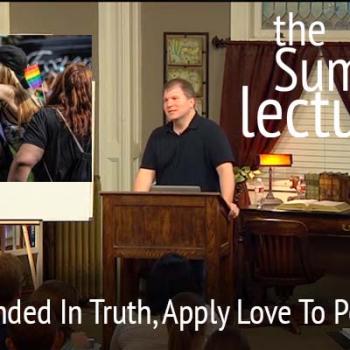The War Against The Weak
To purchase the entire Summit Lecture Series, Vol. 2 on DVD, visit summit.org.
John Stonestreet:
Why was there such a belief in progress? Yes.
There we go. There was a lot of progress happening, right? I mean, before modernism, we thought that someone was demon-possessed. And then we figured out they had epilepsy, we could give them medication, right? We thought that if a woman couldn’t have a baby, she was cursed by the gods, and you need to feed her mandrakes or something like that. Now, we take her to the fertility clinic, and she can become optimum, right? So we figured out a lot of these scientific problems with scientific solutions. I mean, how much science happened prior to 1500? How much has happened since 15…? You get the point, right?
Now, what happened is modernism, some people, some of these thinkers in the modern period, primarily people like Karl Marx, Margaret Sanger, some of the big kind of founders, Henry Ford, the Ford Foundation, Carnegie, and all these guys, they went beyond the belief in progress to a belief in utopia. What is a belief in utopia? What does utopia mean? Yeah, that we’re going to have a perfect society. You can read some of the social scientists. At the end of the 1800s, beginning of the 1900s, and here’s what they’re saying, “We have gotten religion off our back. And now, we can move forward into progress. We’re going to enter an unfettered area of progress.”
Now, two theories on how progress was going to take place in utopianism. One, through economics. Who thought they could bring utopia through economics? Karl Marx, and that was communism. The other one was eugenics. Who thought they could bring a perfect world through eugenics? We always say Hitler. Where did Hitler get his ideas? Yeah.
Not Stalin. Nope. What?
Not directly from Margaret Sanger but the same place that she got it, right? Listen, the first person that coined that term eugenics… How many guys know what I mean when I say eugenics? How many guys don’t know what I mean when I say eugenics? Okay, here’s eugenics. The breeding of perfect people by getting rid of the unfit. It’s basically applying breeding techniques to people that you apply to animals.
Now, what idea hit the radar screen at the end of the 1800s that made that really believable?
Yeah. The Origin of Species, because we started to think that humans were nothing more than what?
Animals.
Animals. And if we can breed better dogs, we can breed better… There we go. Now, you want to lose some sleep when you go home, and some of you are like, “Nope.” But if you do, here’s what you google. Ready? Eugenics in America. Because what you will find is, is that Hitler gotten much of his ideas from American intellectuals. There are letters from the mayor of Chicago congratulating Adolf Hitler on his eugenic success.
Margaret Sanger, unbelievable. Eugenicist. Racist. Hiller thought the unfit were the Jews. Who did Sanger think who were the unfit? African Americans and the poor. She thought being poor was genetic. So she started a program called the Negro Project where her goal was to essentially eliminate or curb the Black population. She co-opted Black pastors, paid them a hundred bucks for every sermon they would preach basically, encouraging their congregation not to have any babies. You will not find any of this on the Planned Parenthood website. Sanger was the founder of Planned Parenthood. By the way, now Planned Parenthood clinics, 80% of them are in minority neighborhoods. You say, “John, are you saying Planned Parenthood is a racist organization?” Absolutely, I am saying Planned Parenthood is a racist organization.
Let me give you the book. Ready? The book. You want to cause a lot of trouble on your college campus? Get this book. Secular Jew from Harvard wrote this book. Edwin Black is the name of the author. Edwin Black. And the title of the book is The War Against The Weak. The story’s unbelievable. Black is a secular Jew looking at the Holocaust. He wrote his first book on how the German church was co-opted in to the Holocaust. And as an atheist, secular Jew, he wanted to find that. But as he was writing that book, he started to see all this other correspondence. He started to see all these other connections, not between, get this, the Third Reich and American Christians but between the Third Reich and American secularists. The War Against The Weak. If you want the summary of it, there’s a book in the bookstore. Chapter 6 of this book sums this all up. It’s a book called Liberal Fascism by Jonah Goldberg. Liberal Fascism, unbelievable stuff.
Now, so there was a lot of promise of utopia. At the end of the 1800s, while all these people were promising utopia, there was another guy, another guy that was thinking differently. He was an atheist. He was the one who… In fact, he gets a really bad rap today, and I think it’s because he said God is dead and he died of syphilis. But other than that, Frederick Nietzsche had a different view. While all the other secularists were predicting utopia, Frederick Nietzsche, also an atheist, was predicting that the 20th century would be the bloodiest century in human history. What was the bloodiest century in human history? The 20th century? Why did Nietzsche predict this? Because what everyone else believed was that God was off our backs, we could move forward. What Nietzsche believed is, is that God wasn’t just a belief. It was a controlling belief. In other words, what you believe about God determines what you believe about everything else.
And so Nietzsche realized that God was like the sun, and Western civ was revolving around it. And so if the sun disappears, suddenly, we have nothing to revolve around. We have to have new definitions of life and truth, and God and morality, and power, and education, and law and politics, and all that sort of stuff. So what Nietzsche said is the 20th century would be a century in which there would be a whole lot of people trying to take God’s place. In other words, the death of God meant the will to power. This is where he got the idea. You’ve heard this from Nietzsche, the Superman, right? The Übermensch. Let me give you an article. If I had time, I would go over it with you. It’s just absolutely powerful. The article from Nietzsche is called the Parable of the Madman. Now, this is the book. But look up the Parable of the Madman. In the Parable of the Madman, Nietzsche tells us he predicts in 1899 what the 20th century was going to be like. Who was right, the utopianist or Nietzsche?
Let me go back. How did the 20th century begin, the century of utopia, the century of promised progress and unfettered advance of civilization? How did the 20th century begin with? World War I closely followed by World War II, which gave us nuclear capability and gave us the what? The Cold War where we fought this Cold War in Korea and Vietnam, and we had two people with their finger on a button. Now, I’m not old enough to have ever done this, but some of your parents and grandparents, my parents, my older siblings actually did nuclear drill. You know nuclear drills? You ever heard of nuclear drills? It’s basically a time when there was a kind of the tensions of the Cold War were pretty high. They basically drilled school children on what to do in case of a nuclear attack, which is get under your desk.
Now, when I was nine years old and I cannot explain this, why PBS did this, or why my parents won’t let me watch this. PBS had a documentary on the nuclear bomb. It was animated with stick figures, and it was basically what happens in case of atomic attack, a nuclear attack. And this little stick figure is like… It’s like there. And it’s like, “Well, first, there’ll be a bright light that will blind you,” and little stick figures like, “Aah.” And then it says, “And the heat will be so intense. It will melt the skin off your body, and you’ll die. And the little stick figure just disintegrates.” So get under your desk. Do you see the problem? So what happens is midway through the 20th century, some French thinkers, the guys that I told you about, Lyotard, Derrida, Foucault, they start to realize that all the utopian promises of modernism were what? Bogus.
Follow Christian Podcast Central on Facebook, Instagram and Twitter to see our ongoing discussion with Dr. Jeff Myers regarding worldviews.
(This podcast is by Summit Ministries. Discovered by Christian Podcast Central and our community — copyright is owned by the publisher, not Christian Podcast Central.)Summit Lecture Series: The War Against The Weak












